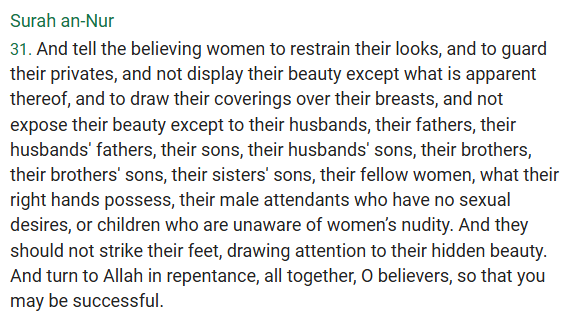

Hello,
Sign up to join our community!


Sign up to join our community!


Please sign in to your account!
Lost your password? Please enter your email address. You will receive a link and will create a new password via email.
Please briefly explain why you feel this question should be reported.
Please briefly explain why you feel this answer should be reported.
Please briefly explain why you feel this user should be reported.
Why is covering one's head considered sacred and mandatory, especially in places of worship in most religions (veil, mantilla, hijab)
Covering one's head in places of worship or during religious practice is considered sacred in many religions because it symbolizes humility, respect, and submission to the divine. It's not just about external appearance — it's a spiritual gesture acknowledging that there's something higher, greater,Read more
Why do many people criticize Sharia law without understanding its true principles and goals in creating justice and mercy?
Many discredit Islam because of propaganda masterminded by who knows who, starting from films to the formation of terrorist groups in the name of Islam. This causes people who do not know Islam to immediately judge Islamic teachings according to what they see and hear from propaganda media.
Many discredit Islam because of propaganda masterminded by who knows who, starting from films to the formation of terrorist groups in the name of Islam. This causes people who do not know Islam to immediately judge Islamic teachings according to what they see and hear from propaganda media.
See lessWhy do many people criticize Sharia law without understanding its true principles and goals in creating justice and mercy?
Now, let's take for instance-for someone who hasn’t met Muslims personally or studied Islam deeply, it’s easy to form opinions based on fear or sensational stories. Media rarely shows Muslims feeding the poor, praying with sincerity, forgiving others, or standing up for justice and those are all reaRead more
Now, let’s take for instance-for someone who hasn’t met Muslims personally or studied Islam deeply, it’s easy to form opinions based on fear or sensational stories. Media rarely shows Muslims feeding the poor, praying with sincerity, forgiving others, or standing up for justice and those are all real parts of Islamic life.
See lessWhy do many people criticize Sharia law without understanding its true principles and goals in creating justice and mercy?
This really interests me so much- It's such a powerful and important question. Many people who criticize Islam or associate it with violence often do so without truly understanding the faith or its core values. Islam, at its heart, is a religion built on peace, justice, compassion, and submission toRead more
This really interests me so much- It’s such a powerful and important question.
Many people who criticize Islam or associate it with violence often do so without truly understanding the faith or its core values. Islam, at its heart, is a religion built on peace, justice, compassion, and submission to God — not hatred or harm. But unfortunately, what often shapes public opinion isn’t the Qur’an or the lives of everyday Muslims — it’s the headlines, movies, and media narratives that focus on conflict, extremism, or isolated acts of violence done in the name of religion.
See lessWhat does it truly mean to 'seek truth' in your faith or worldview, and how do you approach conversations with those who believe differently?
truth in Islam is absolute, sourced from the Qur'an, Hadith, and ijma (consensus of scholars). These three sources must be a guide for a Muslim to determine the truth in various aspects of life. However, a Muslim is also ordered not to be arrogant and must not force his beliefs on followers of otherRead more
truth in Islam is absolute, sourced from the Qur’an, Hadith, and ijma (consensus of scholars). These three sources must be a guide for a Muslim to determine the truth in various aspects of life.
However, a Muslim is also ordered not to be arrogant and must not force his beliefs on followers of other religions. A Muslim is only required to convey the truth, not to force the truth.
Therefore, we must continue to respect the beliefs of others and must continue to do good to all humans.
See lessHave you ever converted from one religion to another?
I haven’t really converted from one religion to another . I was born into Islam and have remained Muslim throughout my life. But my connection to the faith hasn’t just been cultural or inherited — over time, I’ve come to understand "why" I believe, not just "what" I was taught. There have been momenRead more
I haven’t really converted from one religion to another . I was born into Islam and have remained Muslim throughout my life. But my connection to the faith hasn’t just been cultural or inherited — over time, I’ve come to understand “why” I believe, not just “what” I was taught.
There have been moments where I questioned, reflected, and deepened my understanding. For me, Islam is not only a belief system but also a way of life that offers clarity, structure, and spiritual grounding. I try to live it with intention and humility — not just out of habit or identity, but through learning, experience, and personal conviction.
Even though I haven’t changed religions, I have deep respect for those who have — it takes a lot of courage and reflection. I believe we all have our own journeys, and sharing them honestly helps us understand each other better.
See lessWhy is covering one's head considered sacred and mandatory, especially in places of worship in most religions (veil, mantilla, hijab)
Covering the head, especially for women in Islam, is sacred, because it is ordered directly by God through verses of the Qur'an.
Covering the head, especially for women in Islam, is sacred, because it is ordered directly by God through verses of the Qur’an.
See lessWhat country are you from and what is your belief system?
I am from Indonesia and a Muslim, with a religious environment and tolerance between religious communities.
I am from Indonesia and a Muslim, with a religious environment and tolerance between religious communities.
See lessHave you ever converted from one religion to another?
I have never changed religion, but I know people who changed from Christianity to Islam because they found much goodness and true peace when studying Islam.
I have never changed religion, but I know people who changed from Christianity to Islam because they found much goodness and true peace when studying Islam.
See lessWhat country are you from and what is your belief system?
I’m from Nigeria, and while I come from a place where faith plays a big role in everyday life, I approach this platform more as a listener and learner. I’m here to explore different belief systems. My aim isn’t to debate or convince, but to build perspective by hearing from others across traditions.
I’m from Nigeria, and while I come from a place where faith plays a big role in everyday life, I approach this platform more as a listener and learner. I’m here to explore different belief systems.
My aim isn’t to debate or convince, but to build perspective by hearing from others across traditions.
See less